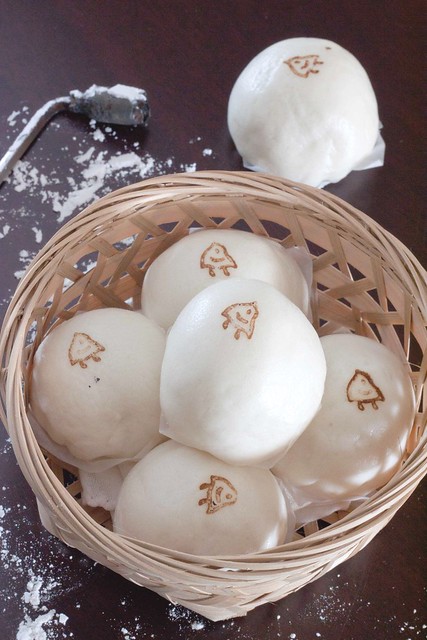
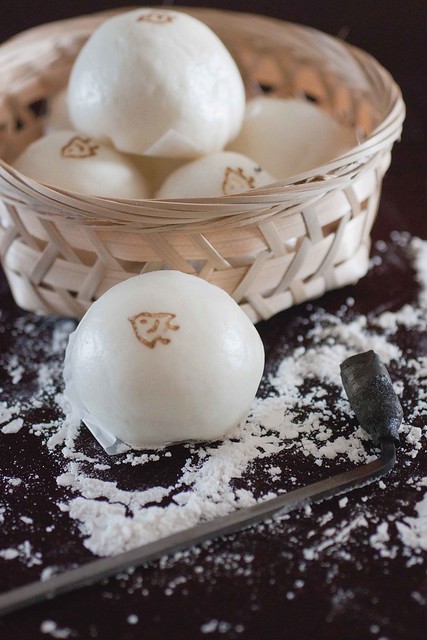
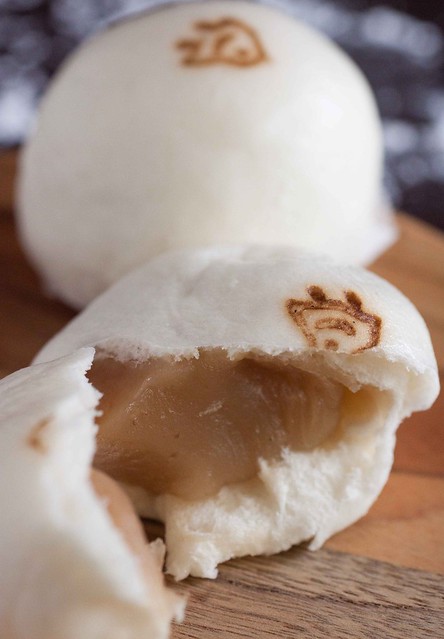
I shall officially admit that the yeasted species have bewitched me. First the sweet soft buns and now, the snowy white chinese steamed buns aka Paus. I have been making paus everyday over the long weekend here and have been enjoying every minute of it. It helps when the friends and family to whom these were distributed gave positive feedback. I am happy to have a chance to work on this again as it is rare nowadays that I get to repeat the same recipe. The best way to hone and improve is really to practice - there is absolutely no other ways around it.
The versatile Pau recipe makes this alot easier as there are many different types of filling that one can vary to retain it's allure.
Today, I take the easy way out by wrapping it with White Lotus Paste. Easy because, this is readily available at this time of the year when Mooncake Festival is just round the corner. Almost all bakery ingredient outlets now carry a variety of lotus paste. I got mine from Kwong Cheong Thye - a low sugar version from Hong Kong that is fragrant and smooth.
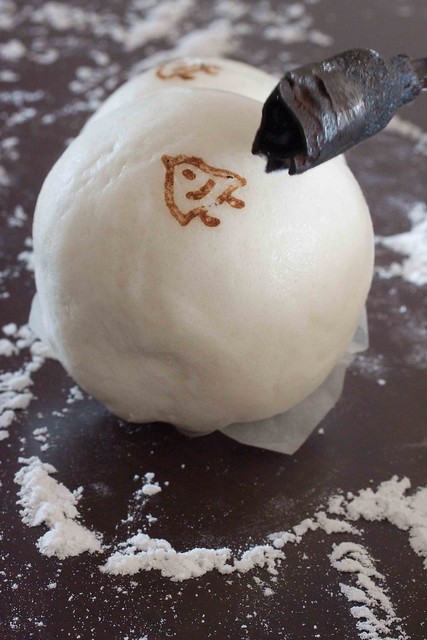
Make these small enough and you may find yourself devouring one bun after another like me. I like my Paus bulging with filling. I used to feel very cheated when the commercially available versions stinge on the quantity of the filling. Now that I am making these myself, I am beginning to think that apart from the reason for cost stinging, poor pau making technique may have something to do with the pithy dollop of filling. To pile on the filling in the buns, the dough needs to be rolled out carefully such that the center is thicker and the peripheral rim thinner. Failure to do this, would usually have the filling burst through the thin dough when it is being steamed.
With enough practice, I am now able to pile on more filling than dough for this lotus paste bun. So fulfilling, so generous and oh so satisfying!
So what Pau should I attempt next?
P.S. : In case you are wondering about the sear mark on the buns... I stamp these with the searing iron I bought a few years back in Japan... curiosity got the better of me then and it has been sitting in my kitchen drawer ever since... :)
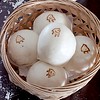
Recipe :
Dough Recipe found here
Filling : ready made lotus paste.
Method :
Please refer to here.
Size of dough for each bun is 19g. Weight of lotus paste portion for each bun is 22g.

Mmm these look soft, pillowy, perfect...but Shirley, just one little request...please make these with whole wheat flour =p
ReplyDelete:D ... I will remember that Xiaolu! :p
ReplyDeleteShirley, these are a favorite bao of mine! I love the stamp on the baos, so cute.
ReplyDeleteGlad to hear that you had a wonderful holiday with your family and friends.
Hahah Xiaolu!
ReplyDeleteNow back to the paus, I was wondering what that contraption was when I saw the first photo. Nice touch, the perfect item to test it on.
@Pickyin - yes, very fun to play with. Next time, I will try to sear it on cakes!
ReplyDelete@Peilin - will make some for you next time!
哇SHIRLEY,我好喜欢那个烙印哦!给包子加分不少呢。
ReplyDeleteI love this sweet pau more than the savory ones especially the one with tau sar. I wish I can have one of it now for breakfast rather than my boring oats :(
ReplyDelete茄子: 没有时间好好拍照, 幸好有烙印加分 :)
ReplyDeleteYum! These look delicious. I've only had (similar) ones filled with red bean paste, but lotus bean paste sounds interesting.
ReplyDeleteLove this snow white tau sar pao. Very pretty and yummy :)
ReplyDeletecute searing iron i have the sakura one which is also sitting in my drawer for the longest time. time to dig it out and use it! :)
ReplyDeleteI like lotus paste paus too but tausar paus is my favorite:D Your paus looks so professionally done with "trademark" and all lol! nice touch!
ReplyDeleteI LOVE your searing tool and will definitely look out for it the next tiem I am in Japan.
ReplyDeleteHow about curry chicken filling for your next Pau project?
delicious looking steamed bun
ReplyDeleteThe 莲蓉 looks so smooth, with the smooth skin of the Pau. Flawless! I had to take a closer look at the iron-stamp to make sure it was not Darth Vader's head! LOL
ReplyDeleteand i was wondering about the little stamp! hehehe, it looks so fluffy and soft that I can't help but wish I have one of the pao for breakfast today.
ReplyDeleteThey look so pretty...
ReplyDeleteI am SO in love with you! These look amazing...exactly what I want to eat every day. I wish we had lotus seed paste here!
ReplyDeleteAnother batch of lovely looking pau! Love lotus bean paste!
ReplyDeleteI am most impressed:)
ReplyDeleteThe IMPRESSIONS..stole my heart..One day show us how?
Love the finished product..but would have no idea how to go about them..That teeny branding iron is priceless.
This pau making is really addictive. Yours look perfect. I just made char siew filling today. Can't help but to keep practicing. :) have a great weekend!
ReplyDeletei like that sear mark, look so cute. Ya, this is the best time to make this pau as ready made lotus are plenty in bakery shops. Your pau look so neat and must be good too.
ReplyDeleteI want those baos and also the marker... so cute!
ReplyDeleteShirley... these are gorgeous.
ReplyDeleteI can never make pau like this. Mine will end up all wrinkle-y, flat and not attractive at all ...
(hahaha... even the word verification agrees with me... its showing me "pouted") LOL
Hi,
ReplyDeleteIm making your buns right now, I added in cold milk from the fridge, and 1/2 tsp instant yeast to the dough. I knead by hand for 15 min, put in room tempurature for 10 min and knead for 5 min. I didnt notice my dough rising, and I want to know why my dough smells like yeast?
Hi, first of all, I don't think you should be using cold milk to mix with the yeast. Typically, yeast needs a warm environment to activate. The good temperature should be like baby bottle temperature. Also- what is your room temperature? A good resting room temperature for dough should be between 28-30C.
ReplyDeleteHi, first of all, I don't think you should be using cold milk to mix with the yeast. Typically, yeast needs a warm environment to activate. The good temperature should be like baby bottle temperature. Also- what is your room temperature? A good resting room temperature for dough should be between 28-30C.
ReplyDelete